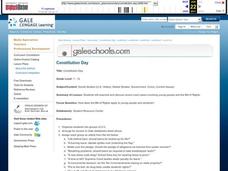Curated OER
Diversity and Equality
Students explore how our political system addresses issues of diversity. After reading an included article, they discuss the constitutionality of student-led prayer in schools. Working in groups, they role play a Supreme Court case...
Curated OER
Social Studies: Native american Tribal Sovereignty
Students examine the issue of tribal sovereignty for Native Americans. Following a mock trial simulation based on the case of Johnson v. McIntosh, they write opinion papers based on the results of the Supreme Court decision in 1823.
Center for Civic Education
Matching Game with the US Constitution
In September we celebrate Constitution Day. Begin the celebration with a grand conversation about the US Constitution. Follow up the in-depth discussion with a learning game in which scholars match terms to images such as...
Curated OER
Our Country's People, Lesson Two
In this US government worksheet, students answer 8 multiple choice questions about the laws, courts, and Constitution of the United States.
Curated OER
The Right to Education for California's Minorities and Immigrants Offline Lesson Plan
Students examine the elements of various court cases and how state and federal laws affect them. They participate in mock trials.
Curated OER
President Jackson, the Cherokee and Indian Removal
Students interpret historical evidence presented in primary and secondary resources. In this Indian Removal Act lesson, students examine the act and discuss the implications of moving the Cherokee. Students...
Curated OER
The Constitution Lives! How it Protects Your Rights Today
Students brainstorm their rights as Americans. In this The Constitution Lives! activity, students discern the difference between rights and rules by completing a worksheet. Students consider the differences between types of...
Curated OER
State v. Hershberger
Students examine citizen rights and protections. In this Minnesota courts lesson, students examine primary documents from State v. Hershberger and discuss the implications of the decision.
Curated OER
Constitution Day
Pupils examine and discuss recent court cases involving young people and the Bill of Rights.They use a focus question to create the context for class discussion: How does the Bill of Rights apply to young people and students?
Curated OER
Race and the United States Constitution
Students examine the topic of race within the United States Constitution. Using case texts, they analyze how the documents deal with the issue of race. In groups, they explore the Court's definitions of citizen. They create a poster...
Curated OER
The Constitution and The Bill of Rights
Studnets learn about The Constitution and The Bill of Rights through a series on Internet pages that include such things as the framers, court cases and games.
Curated OER
Religion in the Schools
The requirements of the Equal Access Act are studied and applied to factual situations. By looking at the particular contexts suggested your class can examine the difficulties faced by administrators in whether they should permit...
Judicial Branch of California
A New Constitution….Your Turn!
It's the 1700s, and while returning home from the Constitutional Convention, pupils are propelled to 2777. The United States— emerging from a period of unrest and war—needs help developing a new constitution! Using the material from the...
Curated OER
What's the Difference Between Procedural and Substantive Due Process?
Students discuss the difference between substantive and procedural due process. They research the uses of due process on the internet and books. They also discuss cases involving students and due process.
Curated OER
What is Due Process Anyway?
High schoolers examine the term due process and its historical origins. They compare and constrast the requirements of due process in the United States Constitution and the Indiana Constitution. They also discuss the difference between...
Curated OER
The Changing Meaning of "Due Process"
Learners examine the United States Constitution and how the application for due process differs in two amendments. They research the changing definition of the term since the Civil War. They use the internet to research press coverage of...
Heritage Foundation
The Constitution, Federalism, and the States
The divide between federal and state government is responsible for much of tension that continues to this day, partly because of the US Constitution. The activities in the 14th lesson in a series of 20 are designed to help learners...
Curated OER
Getting Smart About The Pill
By working in pairs your learners can discuss choosing to take the birth control pill. After reading a pamphlet they test their knowledge through the use of a quiz using very delicate material. Quiz material and readings are provided....
Curated OER
Follow the Leader
Here is a phenomenal lesson on the three branches of government for your second and third-graders. It presents this often-confusing information in an easy-to-understand format. Many excellent activities and worksheets are embedded in the...
NPR
Civil Rights of Japanese-American Internees
Prompted by a viewing of Emiko and Chizu Omori’s Rabbit in the Moon, a documentary about the internment of Japanese-Americans during World War II, high schoolers examine a series of documents, including the Bill of Rights and the UN’s...
Alabama Learning Exchange
Creating a Psychology News Wiki
If you're searching for a way to keep your class informed of current psychology news, this ongoing assignment is both educational and engaging. Class members locate and read a psychology article of interest, write a psychological...
Curated OER
Making the Branches of Government Relevant
A discussion of the three branches of government can be a fascinating experience.
Constitutional Rights Foundation
Refugees from the Caribbean: Cuban and Haitian “Boat People”
Should refugees fleeing poverty be allowed the same entrance into the United States as those fleeing persecution? High schoolers read about US foreign policy in the late 20th century regarding refugees from Cuba and Haiti, and engage in...
Center for Civic Education
The Power of Nonviolence: Rosa Parks: A Quest for Equal Protection Under the Law
Teach young historians about the historical legacy of Rosa Parks with a multi-faceted lesson plan. Pupils follow stations and use journals to explore prominent events, analyze primary resource documents, and engage in interesting...
Other popular searches
- Supreme Court Cases
- Supreme Court Case Studies
- Supreme Court Justices
- The Supreme Court
- Landmark Supreme Court Cases
- Supreme Court Decisions
- Supreme Court Rulings
- Corporations Supreme Court
- Writing Lesson Supreme Court
- Michigan Supreme Court
- Supreme Court Nominations
- Famous Supreme Court Cases























